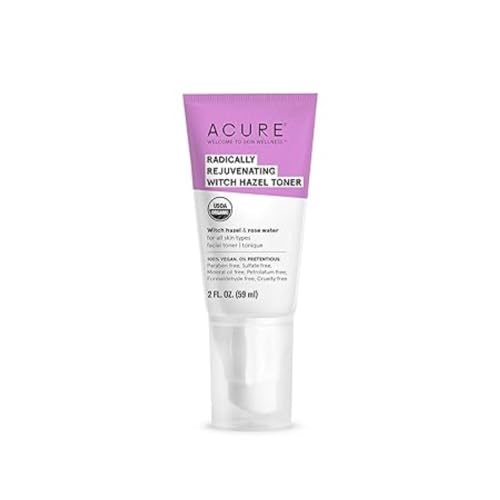
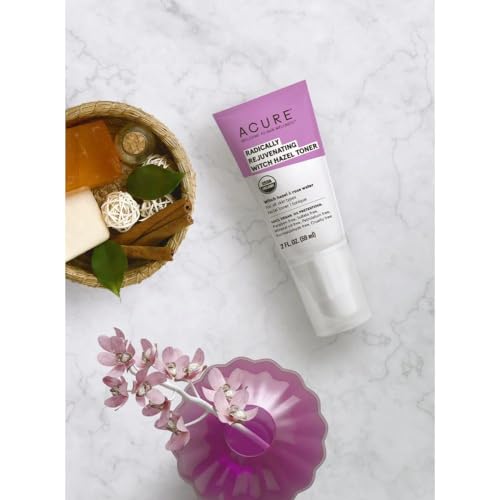
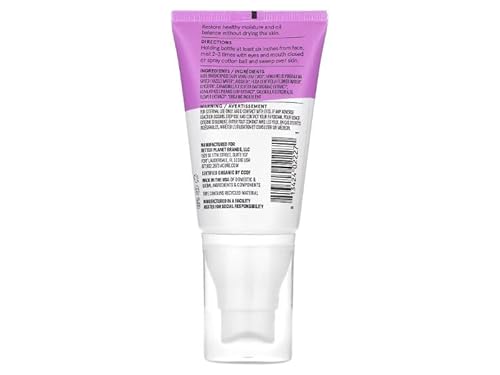
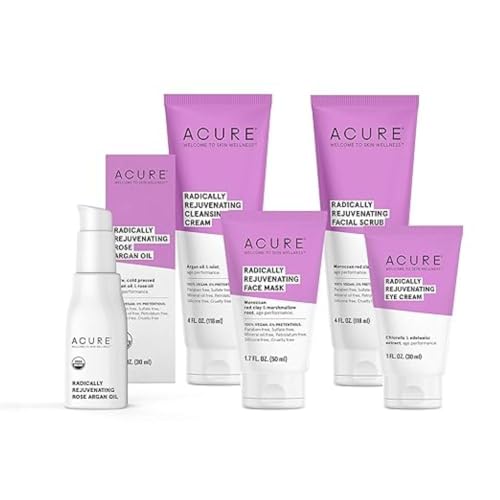
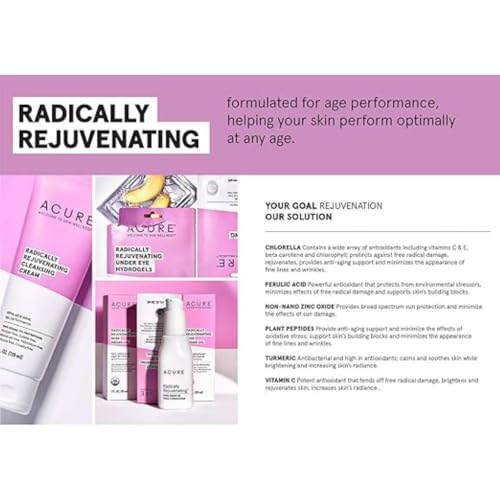
ACURE Face Toner - Restores Moisture & Oil Balance, Witch Hazel & Rose Water - 2 Fl Oz


Glycerin
Medium RiskGlycerin (also called glycerol) is a naturally occurring compound commonly used in personal care and cosmetic products. It functions as a humectant, attracting moisture to the skin, and is also utilized as a solvent and emollient to enhance product texture and stability.
Sustai Insights
Glycerin is valued for its effective moisturizing properties and biodegradability, making it a widely accepted ingredient in formulations. It poses low health risks, including low concerns for carcinogenicity and allergies. However, moderate use restrictions exist due to regulatory guidelines. While glycerin does not significantly contribute to environmental pollution, its production process should be ethically sourced. Overall, glycerin holds a medium risk level, emphasizing the importance of safe usage practices and considering sustainable alternatives.
Hamamelis Virginiana (Witch Hazel) Water
Low RiskHamamelis virginiana (witch hazel) water is an aqueous extract derived from the bark and leaves of the witch hazel plant. It is commonly used in cosmetic formulations for its astringent, soothing, and anti-inflammatory properties, primarily targeting skin care applications.
Sustai Insights
Witch hazel water offers functional benefits such as skin toning and reducing irritation, making it a popular choice in cosmetic products. It is sustainably sourced and biodegradable. Health risks are minimal, with low concerns regarding carcinogenicity, allergies, or developmental toxicity. Environmental impact is generally low, with no significant pollutant or bioaccumulation concerns noted. Regulatory status is favorable, with no major advisories. Safe usage practices should be observed, especially for sensitive skin. Alternatives may include aloe vera or rose water for similar benefits. Overall, the risk associated with witch hazel water is assessed as low.
Aspalathus Linearis (Rooibos) Leaf Extract
Low RiskAspalathus linearis leaf extract is an extract derived from the leaves of the rooibos plant, commonly used for its antioxidant properties and potential health benefits in cosmetic and personal care products. It is known for its soothing effects and is often included in formulations aimed at sensitive skin.
Sustai Insights
Aspalathus linearis offers functional benefits as an antioxidant and soothing agent, making it suitable for sensitive skin formulations. It is considered sustainable due to its natural sourcing and low environmental impact. Health risks are minimal, with low concerns for carcinogenicity, allergies, and reproductive toxicity. No regulatory restrictions are noted, with overall risk assessed as low. Safe usage practices involve standard application methods, and while alternatives exist, they may not match its specific benefits.
Calendula Officinalis (Pot Marigold) Flower Extract
Low RiskExtract of the Calendula (Calendula officinalis) flower, commonly known as pot marigold, is utilized in cosmetic formulations for its soothing and anti-inflammatory properties. It is often included in creams, lotions, and ointments to promote skin health and healing.
Sustai Insights
Calendula officinalis flower extract offers functional benefits such as skin soothing and anti-inflammatory effects, making it valuable in topical applications. It is considered low risk for health impacts, with minimal concerns regarding carcinogenicity, allergies, or reproductive toxicity. Environmentally, it presents low pollution potential and is not bioaccumulative. Regulatory bodies have not imposed significant restrictions. Safe usage practices should be followed, and while alternatives exist, this extract is generally regarded as a low-risk option for cosmetic use.
Rosa Centifolia (Cabbage Rose) Flower Water
Low RiskRosa centifolia (cabbage rose) flower water is an aqueous solution derived from the petals of the cabbage rose. It is commonly used in cosmetic formulations for its aromatic properties and as a skin-conditioning agent, helping to hydrate and soothe the skin.
Sustai Insights
Rosa centifolia flower water offers functional benefits such as hydration and soothing properties, making it popular in skincare products. It is sustainably sourced and has a low environmental impact, with no significant bioaccumulation or pollution concerns. Health risks are minimal, with low associations for carcinogenicity, allergy, or reproductive toxicity. Regulatory bodies do not impose restrictions on its usage. Overall, it presents a low risk, making it a safe choice for cosmetic applications.
Chamomilla Recutita (Matricaria) Extract
Low RiskChamomilla recutita (Matricaria) extract is derived from the flowers of the chamomile plant. It is commonly used in cosmetic formulations for its potential soothing and anti-inflammatory properties. This extract is often included in skin care products aimed at reducing irritation and enhancing skin comfort.
Sustai Insights
Chamomilla recutita extract offers functional benefits such as anti-inflammatory and soothing properties, making it valuable in cosmetics for sensitive skin. It is considered low risk regarding health concerns like carcinogenicity, allergenic potential, and neurotoxicity, with no significant environmental hazards reported. Regulatory bodies have not issued major restrictions. Overall, this ingredient can be safely utilized in cosmetic products with low health and environmental risk.
Ethanol
Low RiskEthanol, also known as ethyl alcohol, is a volatile, colorless liquid commonly used as a solvent, preservative, and antiseptic in various personal care products. It serves as a penetration enhancer, improving the absorption of other ingredients through the skin.
Sustai Insights
Ethanol functions effectively as a preservative and solvent, offering benefits such as enhanced ingredient absorption and antimicrobial properties. It is biodegradable and can be sustainably sourced. Health risks are minimal, with low concerns for carcinogenicity, allergies, and developmental toxicity. Environmental impacts are also low, with no significant pollutant potential. Regulatory agencies do not impose restrictions on its use. Overall, ethanol is considered low risk, making it a widely accepted ingredient in personal care formulations.
Aloe Barbadensis (Aloe Vera) Leaf Juice
Low RiskAloe barbadensis (aloe vera) leaf juice is derived from the succulent aloe vera plant, known for its hydrating and soothing properties. It is commonly used in cosmetic formulations for its moisturizing effects and is often included in products aimed at skin care and healing.
Sustai Insights
Aloe vera leaf juice offers functional benefits as a moisturizer and skin soothing agent, while being sustainably sourced and biodegradable. Health risks are low, with minimal concerns regarding carcinogenicity, allergies, and reproductive toxicity. Environmental impact is also low, with no significant pollutants identified. Regulatory agencies impose few restrictions. Overall, the ingredient poses a low risk, making it a favorable choice in cosmetic formulations.
Hamamelis Virginiana (Witch Hazel) Water
Low RiskHamamelis virginiana (witch hazel) water is an aqueous extract derived from the bark and leaves of the witch hazel plant. It is commonly used in cosmetic formulations for its astringent, soothing, and anti-inflammatory properties, primarily targeting skin care applications.
Sustai Insights
Witch hazel water offers functional benefits such as skin toning and reducing irritation, making it a popular choice in cosmetic products. It is sustainably sourced and biodegradable. Health risks are minimal, with low concerns regarding carcinogenicity, allergies, or developmental toxicity. Environmental impact is generally low, with no significant pollutant or bioaccumulation concerns noted. Regulatory status is favorable, with no major advisories. Safe usage practices should be observed, especially for sensitive skin. Alternatives may include aloe vera or rose water for similar benefits. Overall, the risk associated with witch hazel water is assessed as low.
Aspalathus Linearis (Rooibos) Leaf Extract
Low RiskAspalathus linearis leaf extract is an extract derived from the leaves of the rooibos plant, commonly used for its antioxidant properties and potential health benefits in cosmetic and personal care products. It is known for its soothing effects and is often included in formulations aimed at sensitive skin.
Sustai Insights
Aspalathus linearis offers functional benefits as an antioxidant and soothing agent, making it suitable for sensitive skin formulations. It is considered sustainable due to its natural sourcing and low environmental impact. Health risks are minimal, with low concerns for carcinogenicity, allergies, and reproductive toxicity. No regulatory restrictions are noted, with overall risk assessed as low. Safe usage practices involve standard application methods, and while alternatives exist, they may not match its specific benefits.
Calendula Officinalis (Pot Marigold) Flower Extract
Low RiskExtract of the Calendula (Calendula officinalis) flower, commonly known as pot marigold, is utilized in cosmetic formulations for its soothing and anti-inflammatory properties. It is often included in creams, lotions, and ointments to promote skin health and healing.
Sustai Insights
Calendula officinalis flower extract offers functional benefits such as skin soothing and anti-inflammatory effects, making it valuable in topical applications. It is considered low risk for health impacts, with minimal concerns regarding carcinogenicity, allergies, or reproductive toxicity. Environmentally, it presents low pollution potential and is not bioaccumulative. Regulatory bodies have not imposed significant restrictions. Safe usage practices should be followed, and while alternatives exist, this extract is generally regarded as a low-risk option for cosmetic use.
Rosa Centifolia (Cabbage Rose) Flower Water
Low RiskRosa centifolia (cabbage rose) flower water is an aqueous solution derived from the petals of the cabbage rose. It is commonly used in cosmetic formulations for its aromatic properties and as a skin-conditioning agent, helping to hydrate and soothe the skin.
Sustai Insights
Rosa centifolia flower water offers functional benefits such as hydration and soothing properties, making it popular in skincare products. It is sustainably sourced and has a low environmental impact, with no significant bioaccumulation or pollution concerns. Health risks are minimal, with low associations for carcinogenicity, allergy, or reproductive toxicity. Regulatory bodies do not impose restrictions on its usage. Overall, it presents a low risk, making it a safe choice for cosmetic applications.
Chamomilla Recutita (Matricaria) Extract
Low RiskChamomilla recutita (Matricaria) extract is derived from the flowers of the chamomile plant. It is commonly used in cosmetic formulations for its potential soothing and anti-inflammatory properties. This extract is often included in skin care products aimed at reducing irritation and enhancing skin comfort.
Sustai Insights
Chamomilla recutita extract offers functional benefits such as anti-inflammatory and soothing properties, making it valuable in cosmetics for sensitive skin. It is considered low risk regarding health concerns like carcinogenicity, allergenic potential, and neurotoxicity, with no significant environmental hazards reported. Regulatory bodies have not issued major restrictions. Overall, this ingredient can be safely utilized in cosmetic products with low health and environmental risk.
Ethanol
Low RiskEthanol, also known as ethyl alcohol, is a volatile, colorless liquid commonly used as a solvent, preservative, and antiseptic in various personal care products. It serves as a penetration enhancer, improving the absorption of other ingredients through the skin.
Sustai Insights
Ethanol functions effectively as a preservative and solvent, offering benefits such as enhanced ingredient absorption and antimicrobial properties. It is biodegradable and can be sustainably sourced. Health risks are minimal, with low concerns for carcinogenicity, allergies, and developmental toxicity. Environmental impacts are also low, with no significant pollutant potential. Regulatory agencies do not impose restrictions on its use. Overall, ethanol is considered low risk, making it a widely accepted ingredient in personal care formulations.
Glycerin
Medium RiskGlycerin (also called glycerol) is a naturally occurring compound commonly used in personal care and cosmetic products. It functions as a humectant, attracting moisture to the skin, and is also utilized as a solvent and emollient to enhance product texture and stability.
Sustai Insights
Glycerin is valued for its effective moisturizing properties and biodegradability, making it a widely accepted ingredient in formulations. It poses low health risks, including low concerns for carcinogenicity and allergies. However, moderate use restrictions exist due to regulatory guidelines. While glycerin does not significantly contribute to environmental pollution, its production process should be ethically sourced. Overall, glycerin holds a medium risk level, emphasizing the importance of safe usage practices and considering sustainable alternatives.
Aloe Barbadensis (Aloe Vera) Leaf Juice
Low RiskAloe barbadensis (aloe vera) leaf juice is derived from the succulent aloe vera plant, known for its hydrating and soothing properties. It is commonly used in cosmetic formulations for its moisturizing effects and is often included in products aimed at skin care and healing.
Sustai Insights
Aloe vera leaf juice offers functional benefits as a moisturizer and skin soothing agent, while being sustainably sourced and biodegradable. Health risks are low, with minimal concerns regarding carcinogenicity, allergies, and reproductive toxicity. Environmental impact is also low, with no significant pollutants identified. Regulatory agencies impose few restrictions. Overall, the ingredient poses a low risk, making it a favorable choice in cosmetic formulations.
Experience the refreshing power of ACURE Radically Rejuvenating Witch Hazel Toner, crafted with organic rose water and witch hazel to restore your skin's moisture and oil balance. This 100% vegan formula is perfect for health-conscious consumers seeking effective skincare solutions.
- Targeted Anti-Aging Support: Infused with plant botanicals, this toner helps rejuvenate skin for a youthful glow.
- Refreshing Hydration: Its age-performance formula restores moisture, leaving skin feeling revitalized and balanced.
- Natural Ingredients: Harnesses the magic of witch hazel and rose water, ensuring a gentle yet effective cleanse.
- Free from Harmful Chemicals: Paraben, sulfate, and formaldehyde-free, providing peace of mind with every use while aligning with Clinically Clean Beauty standards.
- Easy Daily Use: Incorporate into your morning and evening routines for optimal skin health and lasting freshness.
Subscribe & Save with Sustai
- Best Price Guarantee: Always enjoy the lowest prices on sustainable home essentials.
- No Surprises: We’ll notify you before shipping. No hidden fees, ever.
- You’re in Charge: Change, pause, or cancel your subscription anytime with ease.
- Eco-Friendly Deliveries: Our grouped shipments mean less packaging and lower emissions.
Join us on a sustainable journey. Special offers for a limited time! Prices and promotions may change.
Recommended Products
Experience the refreshing power of ACURE Radically Rejuvenating Witch Hazel Toner, crafted with organic rose water and witch hazel to restore your skin's moisture and oil balance. This 100% vegan formula is perfect for health-conscious consumers seeking effective skincare solutions.
- Targeted Anti-Aging Support: Infused with plant botanicals, this toner helps rejuvenate skin for a youthful glow.
- Refreshing Hydration: Its age-performance formula restores moisture, leaving skin feeling revitalized and balanced.
- Natural Ingredients: Harnesses the magic of witch hazel and rose water, ensuring a gentle yet effective cleanse.
- Free from Harmful Chemicals: Paraben, sulfate, and formaldehyde-free, providing peace of mind with every use while aligning with Clinically Clean Beauty standards.
- Easy Daily Use: Incorporate into your morning and evening routines for optimal skin health and lasting freshness.

You can have at most 2 Sustainable Steals products in your cart
Customer Reviews
Customers’ View
Customers appreciate the effectiveness and hydrating qualities of ACURE's Radically Rejuvenating Witch Hazel Toner, noting that it provides a refreshing moisture boost and a radiant glow. Many users highlight the natural ingredients, including witch hazel and rose water, which align with their eco-friendly and health-conscious values. However, there are mixed reviews regarding its suitability for sensitive skin, with some customers experiencing irritation or redness after use. Additionally, the scent has garnered negative feedback, with users describing it as unappealing or reminiscent of old soap. Overall, while the toner is praised for its revitalizing properties, potential buyers should consider the varied experiences regarding skin sensitivity and fragrance.
AI-generated from the text of customer reviewsThis product is rated 5.0 of 5.0 stars.
It has received 1 review.





